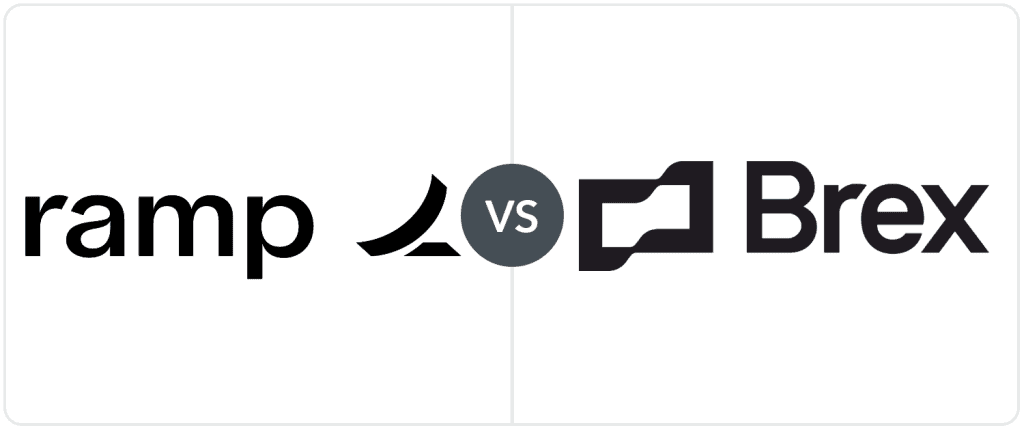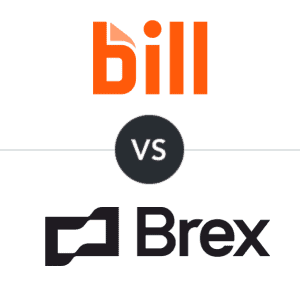Because of how Brex and Ramp have built their services, it's hard to pick a clear winner. Brex may suit the needs of one business, while the Ramp's savings insights may work better for another.

Choosing the right corporate card for your business can be overwhelming, especially when there are dozens of options on the market. The good news is if you’re stuck deciding between Ramp and Brex, there is a clear winner … depending on your business structure and needs.
The even better news is that each card makes it on our list of the best corporate credit cards for businesses, so they’ve already undergone serious vetting on our part to make sure these are the best of the best.
We’ll cover the big differences between Ramp and Brex in our detailed comparison, so that you can choose the perfect corporate card for your business.
|
Ramp |
Brex |
| Rewards |
Up to 1.5% cash back |
- 8x points per $1 on ridesharing and taxis
- 5x points on Brex Travel
- 4x points on restaurant purchases
- 3x points on software subscriptions and eligible Apple product purchases
- 1x points on everything else
|
| Annual Fee |
$0 |
$0 |
| Setup Fee |
$0 |
$0 |
| Late Fee |
$0 |
$0 |
Ramp VS Brex: At A Glance Comparison
By tackling Ramp versus Brex, we’re comparing two of the top modern corporate card companies on the market today. Both Brex and Ramp offer competitive corporate card programs with exciting rewards, as well as expense management and bill pay tools for a variety of businesses.
Ramp and Brex both offer corporate credit cards with spend management, but they have three significant differences.
- The first key difference is their target audiences. Brex is targeted to startups with equity funding and fast-growing tech businesses, while Ramp is geared toward established small to medium-sized businesses that have at least $25,000 in cash reserves to qualify.
- They each have different reward structures as well, with Ramp offering up to 1.5% cashback and Brex offering up to 8x points based on reward spending categories.
- The last major difference is that while Ramp and Brex have many similar features, Brex’s feature set is more focused on cash management, and Ramp’s is more focused on saving money (more on this in our detailed feature comparison).
That’s the quick, at-a-glance comparison of Ramp and Brex. If you can already tell which would fit your business better from our quick overview, check out our full Ramp review or Brex review. If you want a more detailed breakdown of the pros and cons of each corporate card and where they differ, keep reading for a more detailed comparison of these two popular corporate card options.
Where Ramp Wins
- Over $350,000+ in partner rewards on popular business software and purchases
- A unique platform built to help companies cut costs on software subscriptions, recurring transactions, etc.
- Automated savings features
- No fees of any kind
- Multiple integrations & over 80 bank connections available
Where Ramp Falls Short
- Only US-based corporation, LLCs, and LPs are eligible to apply
- You must have at least $25,000 in cash to be eligible to apply (whereas Brex goes off revenue or equity investment, not cash on hand)
- Limited customer support options
Where Brex Wins
- Flexible and unique points-earning structures to maximize earnings on specific purchase categories
- No personal guarantee or personal credit check required
- One of the few cards where startups (with significant revenue or equity investment) are eligible
- Monthly payments are available where most corporate cards only support daily repayments (additional eligibility requirements must be met to unlock monthly repayments)
- Brex offers a Brex bank account as well, so you can manage your startup expenses more holistically in the Brex ecosystem
- Phone support and live web chat are available (as opposed to Ramp, which only offers email support)
Where Brex Falls Short
- You have to make Brex your exclusive corporate card to unlock the highest reward points
- The card’s eligibility requirements can be difficult to meet with businesses needing either $1 million+ in revenue a year, 50 employees, be a recipient of equity investment, or be a startup on the path to one of those qualifications who is referred by an existing Brex customer
- Limited to C-corp, S-corp, LLC, or LLP corporations only
- Does not currently accept small or medium-sized businesses
At this time, Brex is not accepting many small or medium-sized businesses. Instead, its focus is on venture-backed businesses and mid-market businesses that have at least 20 employees (50 if the business is not professionally invested or does not meet $1 million+ in annual revenue requirements). This is the biggest drawback of Brex.
However, this is also what makes Brex stand out. The company is geared toward fast-growing startups and tech companies and isn’t trying to be everything to everyone, making it able to offer unique features, rewards, and partner discounts designed to benefit that specific market.
Ramp VS Brex Pricing & Fees Comparison
Both Ramp and Brex are free of most corporate card fees. This makes both companies excellent choices for businesses that don’t want to spend extra to gain access to a corporate card program.
The lack of fees includes:
- Annual fees
- Setup fees
- Card replacement fees
- Late fees
The only differentiator here is that Brex clearly states that it does not charge foreign transaction fees, whereas Ramp which doesn’t disclose any set foreign transaction fees does say “Ramp may include a margin on foreign exchange.”
Brex does offer a paid Brex Premium plan that includes advanced features like live budgeting, custom accounting integrations, and dedicated admin support, but you can easily use the no-cost Brex Essentials if you don’t need these features.
Also note that while normal credit cards include interest rates, Ramp and Brex do not. This is because these corporate cards are technically charge cards. Unlike normal credit cards, which allow you to carry a balance, charge cards need to be paid off in full at the end of every period. This means that no interest can even be collected. The exception is that certain Brex card holders can qualify for monthly repayments instead of daily repayments.
Ramp VS Brex Rewards & Features Comparison
| Available Services |
Ramp |
Brex |
| Corporate Cards |
|
|
| Cash Management Account |
|
|
| Expense Management |
|
|
| Bill Pay |
|
|
| Accounting Automation |
|
|
| Spend Controls |
|
|
| Instant Revenue |
|
|
Both Brex and Ramp offer robust feature sets that rival other corporate card programs on the market today. These companies are at the forefront of the growing corporate card space, so it makes sense that they offer competitive services and features.
Ramp centers itself around one mission: saving its customers money. This unique goal is achieved through algorithm-driven insights that look at where a company spends money and identify where that company might be able to trim excess costs. Ramp claims that 98% of customers saved over $100,000 in their first year with Ramp. Whether that 98% number is accurate may be debatable, but Ramp’s drive to eliminate unnecessary customer spending is unique within the greater corporate card space because most corporate card companies generate income via interchange fees.
Brex, on the other hand, focuses on cash management through features like instant revenue, expense tracking, automatic bill pay, spend controls through Brex, and its additional Brex banking service (formerly known as Brex cash).
Apart from these two unique feature focuses, here are where Ramp and Brex differ in terms of features, perks, and rewards.
Only Ramp Offers
- Up to 1.5% cash back on all purchases
- Unique savings insight features that allow businesses to receive algorithm-driven savings insights based on their spending history
Only Brex Offers
- Rewards scheme based on purchase categories with up to 8x points on certain purchases
- Brex offers a banking service, whereas Ramp would require a separate business bank account option
Ramp VS Brex Eligibility Requirements Comparison
| Eligibility Requirements |
Ramp |
Brex |
| Personal Guarantee |
No |
No |
| Credit Score |
N/A |
N/A |
| Revenue Required |
$25,000 in cash reserves |
$1 million+ in annual revenue or equity investment |
| Business Structure |
Corporation, LLC, or LP (nonprofits welcome) |
C-corp, S-corp, LLC, or LLP corporations |
| Business Size |
N/A |
20-50+ employees |
Ramp and Brex have some similarities when it comes to eligibility requirements. For instance, both companies require that applicants be a corporation, a limited liability company, or a limited liability partnership. They also have location-based requirements — Ramp requires that applicants be registered in the US, while Brex requires US-based incorporation.
This is where the similarities end. The rest of the requirements show each corporate card’s target audience.
Ramp, geared toward established small to medium-sized businesses, requires $25,000 in cash reserves, whereas Brex, geared toward startups, requires you to meet at least one (not all) of these four requirements:
- $1 million+ in annual revenue
- Equity investment
- 50 employees
- A tech startup on its way to meeting these requirements & who is referred by an existing customer or partner
As a positive, neither Ramp nor Brex requires a personal guarantee because the credit line is handed out to the company and not an individual person. This means your personal credit history or score generally won’t be checked either.
Which Is Better For My Business: Ramp Or Brex?
Ultimately, Ramp and Brex will work best for different types of companies. There’s no one-size-fits-all model here.
Because of how Brex and Ramp have built their services, it’s hard to pick one company over the other as a blanket winner for all business types. The goods news? It’s easy to pick a clear winner for certain business types.
Brex is the better option for startups, fast-growing tech companies, or businesses with 50+ employees. Brex is also a great choice if you to add a business bank service alongside your corporate card and is one of the few companies to offer both services (Rho is the other corporate card that also has banking).
Ramp is the better option if you’re an established small to mid-sized business with $25,000 in cash reserves that may not meet the strict requirements of Brex or don’t need the startup-specific cash management feature focus. Ramp also has better money-savings features and more partner discounts, and for some users.
Choose Ramp If…
- Your business spending would benefit the most from up to 1.5% cash back (or you just don’t want to worry about cash back categories and complicated points structures)
- You have at least $25,000 in cash to qualify
- You value money-saving features and smart algorithm-driven savings insights
- You want a corporate card with no monthly, annual, or late fees
Choose Brex If…
- Your business’s spending matches Brex’s rewards categories to maximize reward points
- You are a startup or fast-growing company in need of a corporate card
- You meet Brex’s strict eligibility requirements
- You value cash management features
- You want the option to add on a Brex banking service
If you still aren’t sure which card is right for you or you want to explore all of your options before committing, you can see how Ramp compares to BILL Spend & Expense or how Brex compares to BILL Spend Expense, which is another corporate card player with much less strict eligibility requirements. Or, check out our full list of the best business credit cards for more options.
If you’re already prepared to make a decision, our post on how to get a corporate card has great tips to get you started.















